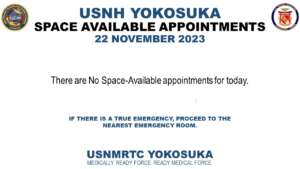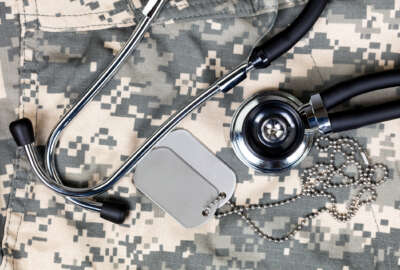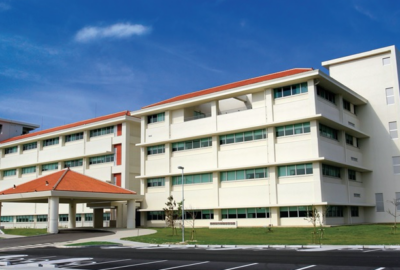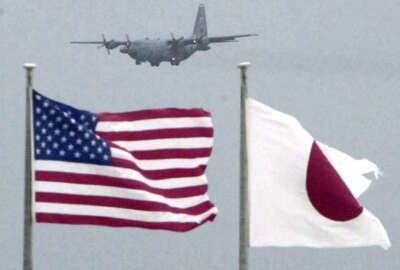In Japan, civilian feds say health care crisis still isn’t fixed
Our readers in Japan respond to a recent Federal News Network interview with the director of the Defense Health Agency -- telling us the civilian employee health...
Earlier this month, Federal News Network published an article summarizing an extended interview with Lt. Gen. Telita Crosland, the director of the Defense Health Agency. That article generated more pushback from our audience than any story I’ve written in my 13 years at Federal News Network, so we thought it was important to share some of it in this week’s Federal Report.
The interview was about bigger strategic issues at DHA, but in the course of our discussion, we talked about the challenges DoD civilian employees have faced in getting access to “space available” health care – an issue we wrote about in depth a year ago.
Crosland told us those problems have been essentially resolved by this point, mainly by a March 2023 memo that reversed an earlier DHA policy which made it much harder for civilians to get appointments and prescription refills. The updated approach, she said, “unencumbered” military treatment facilities to offer the care civilian employees need.
Suffice to say, many of those civilians see things very differently.
“The healthcare crisis for civilians in Japan is ongoing,” said Linda Malley, whose husband is a middle school teacher at Camp Zama, Japan. “Teachers have left and more are planning to when contracts are over. My husband and I are leaving. Since DHA dumped us into the local medical economy without even letting Japanese officials know, we are dealing with [Japanese providers] refusing us, charging us more than posted rates, having to travel long distances to find someone who will see us, and having to pay up front and wait to get reimbursed by our insurance.”
Amber Malone, a DoD civilian in Yokosuka, said the naval hospital there — the largest military treatment facility in the Indo-Pacific — did not appear to have relaxed its policies at all since the March memo.
“Here at Yokosuka, civilians are still limited to same-day calls for any available appointments at 10 a.m., and [by then], most of those appointments are already gone, since TRICARE beneficiaries can call and snag them starting at 7:30 a.m. In all of November, there were only three family medical appointments made available, all on a single day. No other appointments have been available the whole month,” she said. “Lt. Gen. Crosland needs to understand that what she is saying is in direct opposition to what is happening on the ground here in Japan. If she really wants to understand what is going on, she should come hold a town hall herself here at Yokosuka and the other bases in Japan and speak directly to the impacted civilians.”
Another Yokosuka-based DoD employee wrote to say the health care situation there is “worse than it’s ever been.”
“It is a major contributor to why I’m leaving the DoD,” he said. “Please reach out to actual DoD civilians in Japan to find out the truth, and the truth as I see it is that the DoD does not believe it is their mission to ensure personnel they send overseas are receiving adequate medical care.”
We did reach out — and we’re planning more coverage on this issue.
But the employees I’ve talked to over the last few days say the military treatment facilities’ implementation of Crosland’s March memo, intended to expand access to care, has been very uneven across Japan.
According to data gathered by Japan Civilian Medical Advocacy, some MTFs – like the health clinics in Sasebo and Iwakuni — have done much better, sometimes offering dozens of appointments each day. In other places, like Okinawa, last-minute appointment availability isn’t even an issue, since those facilities now allow civilians to schedule their appointments days in advance, rather than making them wait until the same day to find out what’s available.
But the hospital there has had troubles too: in a June memo, the MTF told anyone expecting to deliver a child that they’d have to be temporarily relocated to the continental U.S. and placed into a “stork nesting” program because of a shortage of obstetrics services. A few days later, DHA figured a way out of the problem via contracted clinicians, and issued a news release saying the diversions wouldn’t be necessary after all.
We’ve also heard from several folks who wanted to remind us that the shortfalls in healthcare in Japan aren’t limited to the civilian population – who, by statute, take a back seat to active duty service members, their families, and other TRICARE beneficiaries, such as retirees and their families.
At least four people have died because not even service members and their families could get the acute care they needed — either from MTFs or from Japanese emergency rooms, according to a U.S. Indo-Pacific Command message Federal News Network obtained.
One emailer, a health care provider, said DoD’s inability to offer adequate care to civilians is only a symptom of the Military Health System’s limited capacity in Japan.
“The situation in Japan has not improved and I can’t watch people die preventable deaths from lack of access to care anymore,” said the clinician, who declined to be identified publicly. “Patients already know how to call emergency services. We already have a directory of hospitals to call. We’ve already made laminated cards. We already have longstanding relationships with Japanese hospitals and a fellowship program where we exchange medical education and host Japanese fellows in our MTFs. For years.”
Unlike active duty service members, civilians have a choice about whether they want to take jobs in Japan. And numerous people we’ve spoken with over the past year say the word is already out: the health care situation is a huge deterrence for people who would otherwise jump at the opportunity to work there.
“I’m in the process of leaving Japan. I was diagnosed with a relatively normal thyroid issue but can’t find anyone here in Japan to provide care, and I can’t afford to fly back to the States every three months,” said one longtime Navy employee. “It’s really defeating. I’ve worked for the Navy for 38 years come this April, and I’ve never felt quite so disposable.”
Screenshots from Naval Hospital Yokosuka’s Facebook page – the mechanism the hospital uses each  morning to let people know how many Space A appointments it’s offering on that day – confirm there were only three family medicine appointments for the entire month, up through Nov. 22.
morning to let people know how many Space A appointments it’s offering on that day – confirm there were only three family medicine appointments for the entire month, up through Nov. 22.
On that same day, Federal News Network sent some of the feedback we received to DHA, and five more family medicine appointments appeared on Nov. 24. Nine more appeared on Nov. 27, and another nine appeared on Nov. 28. Each day, all of the available appointments were taken.
In a statement to Federal News Network, DHA acknowledged there continue to be some gaps in its ability to offer space-available care to civilians.
“We are continually reviewing access to care standards for active duty service members and TRICARE Prime beneficiaries to increase space-available appointments for non-enrolled patients because we understand the importance of their health care needs,” the agency said (click here to read DHA’s full statement). “Sometimes, military hospitals and clinics must pause or limit space-available appointments for non-enrolled patients in order to meet required access to care standards for active duty service members and TRICARE Prime beneficiaries. We also realize that while we are making every effort to maximize our appointments — and the number of available appointments has increased from last fall — there will be locations where individuals will be challenged to find appointments that work for them.”
Nearly Useless Factoid
Japan consists of 6,852 islands that were originally attached to the eastern coast of Asia.
Source: Worldstrides.com
Copyright © 2025 Federal News Network. All rights reserved. This website is not intended for users located within the European Economic Area.
Jared Serbu is deputy editor of Federal News Network and reports on the Defense Department’s contracting, legislative, workforce and IT issues.
Follow @jserbuWFED






